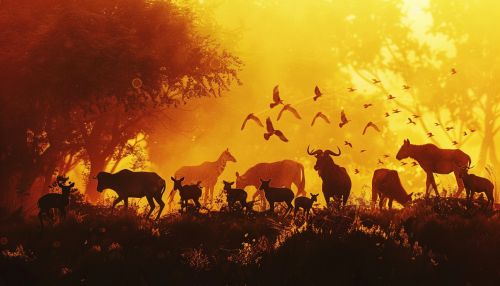Bottleneck Effect
Introduction
The Bottleneck Effect is a significant concept in the field of Population Genetics, which refers to a sharp reduction in the size of a population due to environmental events or human activities. This reduction leads to a decrease in genetic variation among the surviving population, which is a key factor in evolution and biodiversity.
Understanding the Bottleneck Effect
The Bottleneck Effect occurs when a population's size is significantly reduced for at least one generation. This can happen due to various reasons, including natural disasters like floods, earthquakes, or droughts, or human activities such as overhunting or habitat destruction. The surviving population is usually not representative of the original population in terms of genetic diversity. This is because only a small number of individuals survive, and these survivors carry only a small fraction of the original population's genetic variation.


Genetic Consequences of the Bottleneck Effect
The Bottleneck Effect can have profound genetic consequences. The most immediate effect is a reduction in genetic diversity, which can affect the population's ability to adapt to new environmental conditions. This is because the genetic variation that might have helped individuals survive under different conditions has been lost.
In addition, the Bottleneck Effect can lead to a change in allele frequencies, known as Genetic Drift. This can result in the fixation of deleterious alleles, increasing the likelihood of genetic diseases within the population. It can also lead to the loss of beneficial alleles, reducing the population's overall fitness.
Bottleneck Effect and Evolution
The Bottleneck Effect plays a significant role in evolution. By reducing genetic diversity and changing allele frequencies, it can lead to rapid evolutionary change. This is especially true if the surviving population is small, as genetic drift can have a larger effect in smaller populations.
However, the Bottleneck Effect can also hinder evolution by reducing the amount of genetic variation available for natural selection to act upon. This can slow down the rate of evolution and make it more difficult for a population to adapt to changing environmental conditions.
Bottleneck Effect in Conservation Biology
In the field of Conservation Biology, understanding the Bottleneck Effect is crucial. Many endangered species have gone through bottleneck events, which have reduced their genetic diversity and made them more vulnerable to extinction.
Conservation strategies often aim to increase the genetic diversity of endangered populations, for example, by introducing individuals from other populations. This can help to mitigate the effects of the Bottleneck Effect and increase the population's chances of survival.
